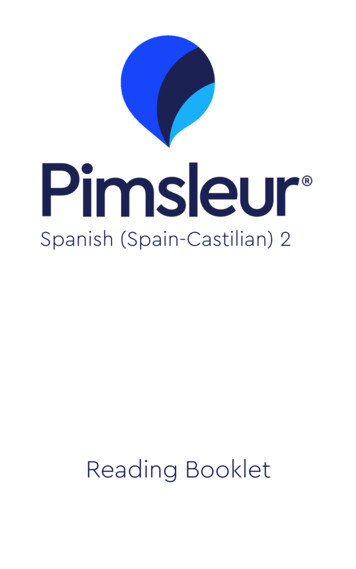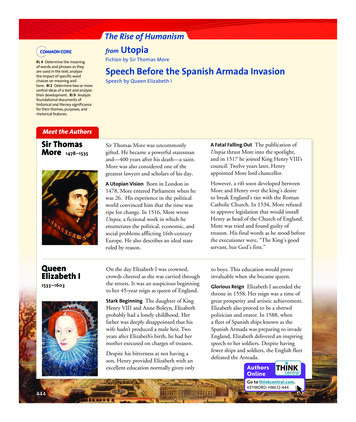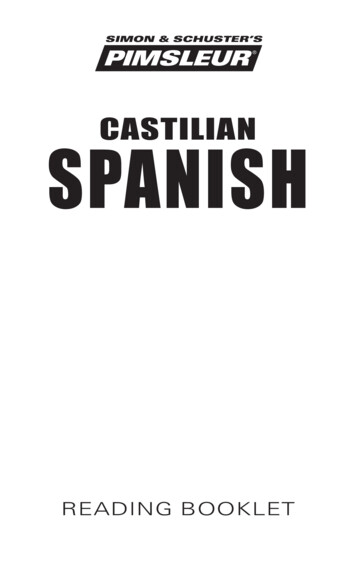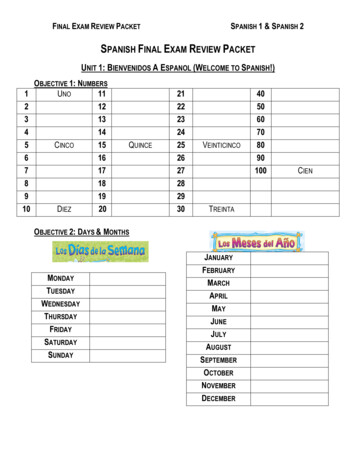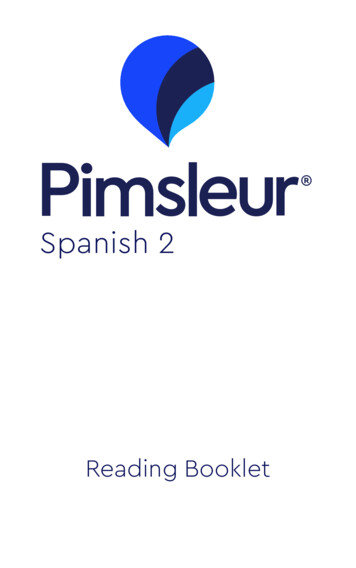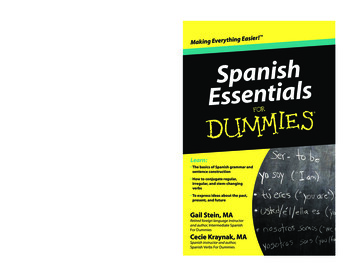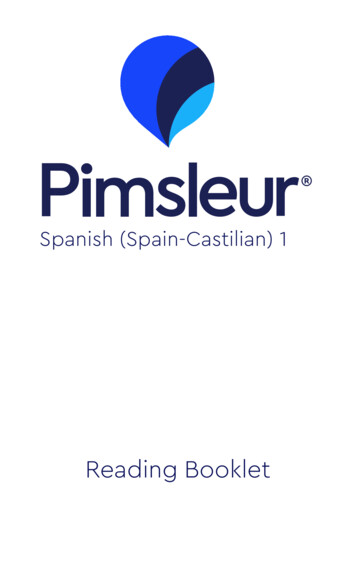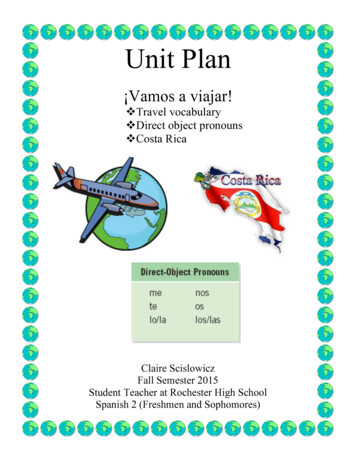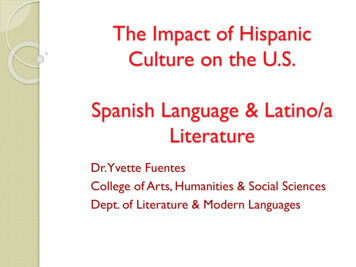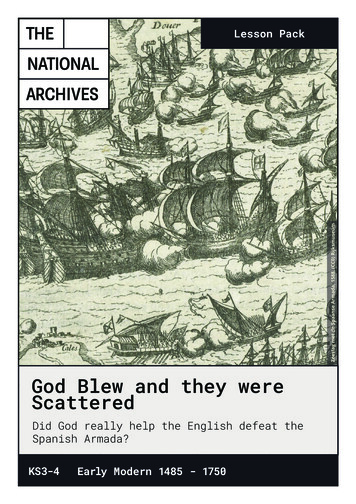
Transcription
Zeeslag met de Spaanse Armada, 1588. (CC0) RijksmuseumLesson PackGod Blew and they wereScatteredDid God really help the English defeat theSpanish Armada?KS3-4Early Modern 1485 - 1750
God blew and they were scatteredDid God help the English defeat the Spanish Armada?Lesson at a GlanceSuitable for:KS3Time period:Early Modern 1485 - 1750Connections to theCurriculum: The development ofChurch, state andsociety in Britain 15091745 The Elizabethanreligious settlementand conflict withCatholics (includingScotland, Spain andIreland)Learning Objective:To closely examine adocument in order todiscover information.To consider howdocuments were used toshape public opinion inthe 1500s.In 1588, King Philip II of Spain sent an armada (a fleet of ships) tocollect his army from the Netherlands, where they were fighting, andtake them to invade England. This was done in the name of religion,because England had become Protestant and no longer accepted thePope as the head of the Church; Spain was Catholic and the Pope hadencouraged Philip to try to make England become Catholic again. Healso had a political reason to go to war with England because Spainruled the Netherlands, but the people there were rebelling againstSpanish control and England had been helping them.The English were worried about the threat of invasion and theyattacked the Spanish ships as they sailed along the Channel, but theArmada was so strong that most of the ships reached Calais safely.The Armada was difficult to attack because it sailed in a ‘crescent’shape. While the Armada tried to get in touch with the Spanish army,the English ships attacked fiercely. However, an important reason whythe English were able to defeat the Armada was that the wind blew theSpanish ships northwards. To many English people this proved thatGod wanted them to win and there were pictures and medals made tocelebrate this fact.ContentsTeachers notes3Tasks4Background6Source One7Source Two9Source Three11Source Four17Timeline of the Armada19This resource was produced using documents from the collections of The National Archives and other copyright holders. Images fromcopyright holders other than the National Archives may not be reproduced for any purposes without the permission of the copyrightholder. Every reasonable effort has been made to trace copyright but the National Archives welcomes any information that clarifies thecopyright ownership of any unattributed material displayed.
God blew and they were scatteredDid God help the English defeat the Spanish Armada?Teacher’s NotesIt is hoped that some of this work will be accessible for key stage 2 work and ‘The Terrible Tudors’in the Horrible History series has some good additional details that most children will appreciate.Some of the suggested activities have obvious links with art and craft work while the use of mapsto study the route of the Armada could lead into geography, map coordinates, mathematics. Aninteractive, problem solving approach is needed for the ‘Council Discussions’ and there are alsolots of opportunities for different styles of writing – stories based on English/Spanish sailors, formalreports, ‘newspaper’ accounts, diaries and letters, ‘televised’ news and interviews.At key stage 3 this work would could be used as a straight account of events, illustrating Englishforeign relations but it could also be used to explore the role of propaganda in Elizabeth’s reign,linking with work on portraits and another lesson on the Great Seal.TasksTask One This is an extract from a letter to the English government which gives details about the progressof the Armada.How useful do you think this information would be to the English government?Why were there more soldiers than sailors?Task Two This is a report from Lord Howard of Effingham, the Admiral of the English fleet.How do you think the news that the Spanish Armada had been sighted was able to reach LordHoward so quickly when he was at Plymouth, over a hundred miles away?Why do you think Howard complained to Walsingham about the wind?Howard says that the Spanish fleet was ‘soe strong’. What made it strong?Task Three The dates mentioned in this account are based on an old calendar which is slightly differentfrom the one we use now. These events took place at the end of July and first week of Augustaccording to our calendar.According to Hawkins, what was the main problem for the English fleet in the battle nearPortland?Why was the ‘fyring of ships’ a turning point in the fighting?Does Hawkins think that the English have a chance to beat the Spanish Armada?What is causing the biggest problem to the Spanish ships?Does Hawkins seem confident that the Spanish have been defeated?Why did the English chase the Spanish as they sailed towards Scotland?3
God blew and they were scatteredDid God help the English defeat the Spanish Armada?Lesson at a GlanceTasksTask Four An extract from a Spanish captain’s account of the events. He had survived after beingshipwrecked on the Irish coast and was then interrogated by the English, but eventuallyreturned home to Spain.The Spanish Armada fought the English fleet for two days without losing any ships. Whathappened next that changed this?Why was it a good thing that the Spanish plans were stopped?If you could change one thing to give the Spanish a better chance of winning what would it beand why?The English celebrated their victory with a medal saying ‘God Blew and they were Scattered’ –how would the Spanish have explained their defeat?Task Five As this was an invasion in the name of religion, it was felt that any unexpected event was asign from God; study the points below and decide which ones show God helped the Englishand which ones show other reasons for English success.Santa Cruz, the Spanish admiral who was to lead the Armada, died and the man who tookover, the Duke of Medina Sidonia, had very little experienceThe Armada set sail on 28 May but bad weather forced the ships to go back into port forrepairsThe Armada kept a very strong crescent shaped formation which protected the smaller shipsas they sailed up the Channel and the English were unable to make a proper attackThe Armada was supposed to sail up the channel to the Netherlands and collect the Duke ofParma with an army to invade England. However, the Spanish army was attacked and couldnot get to the ships in timeThe weather was very bad during the Battle of Gravelines and the storms got worse as theSpanish sailed towards the North SeaThe English were constantly complaining that they were short of gunpowder, cannon balls,food etc.Bad weather continued as the Spanish ships sailed up around the coast of Scotland anddown the coast of Ireland on their way home, so that only half the Armada actually got backto SpainTask Six 4Explain in a short paragraph why many people thought that God had helped the Englishdefeat the Spanish Armada.
God blew and they were scatteredDid God help the English defeat the Spanish Armada?Extension Activities1. Hold a Privy Council meeting to give Elizabeth advice on: how to get sufficient supplies to the ships where the army should meet how to arrange sufficient food etc. to keep the army supplied how to get news of the invasion from the coast to London what to do about English Catholics2. Draw or list items which could be included in a painting of Elizabeth intended tocommemorate the English victory and explain the symbolism of each item. This could then becompared with the Armada portrait by George Gower.3. Draw a strip cartoon showing at least four key events, e.g: the first sighting of the Armada the English sailing behind the Armada in its strong crescent formation the use of fireships the battle at Gravelines the Spanish sailing towards Scotland Spanish ships being shipwrecked on the coast of Ireland4. After such a clear failure, when fewer than half the ships managed to get back to Spain, whydid Philip send other armadas against England?5. As the English troops waited at Tilbury to fight against an invasion, Elizabeth made a famousspeech in which she said that even if she was a weak and feeble woman, the fact that shewas the ruler of England made her strong. Do you think a female ruler would have been at adisadvantage if the invasion had taken place?6. Find the text of Elizabeth’s speech at Tilbury and write it out in modern English.7. Write a newspaper report on the invasion of the Spanish Armada explaining the reasons forthe Spanish defeat.See a timeline of the Armada’s key events on page 19.5
God blew and they were scatteredDid God help the English defeat the Spanish Armada?Lesson at a GlanceBackgroundWhen Mary I died in 1558, England and Spain were allies in a waragainst France. As the war ended, Philip II of Spain wanted to stayon good terms with the new queen, Elizabeth I, and even suggestedthat they marry but Elizabeth politely refused. However, Elizabethalso wanted to stay friends with Spain because there was an alliancebetween Scotland and France – a situation which was very dangerousfor her. Until Elizabeth married and had children, the next in line forthe throne was her relative, Mary Stuart, the Queen of Scotland. ManyCatholics believed Henry VIII’s marriage to Anne Boleyn had not beennot lawful, which meant Elizabeth should not be queen at all andMary, Queen of Scots, should take over immediately. To make mattersworse, Mary was going to marry the French prince, so it was possiblethat French and Scottish armies would invade England to make Maryqueen. Luckily for Elizabeth, Philip did not want to see France becomingso powerful and he was willing to protect her, even though she madeEngland Protestant again.When Philip had to deal with a rebellion in the Netherlands, it was evenmore important to him to be on good terms with England becausehis ships had to sail along the English Channel. However, England feltsome sympathy with the people in the Netherlands because one ofthe reasons they were rebelling against Spain was that some of themwanted to be Protestant. On top of this, there was a lot of anger amongEnglish sailors and traders because Philip would not let other countriesshare in the wealth that had been found in the areas Spain controlledin Central and South America. Meanwhile, England was less threatenedbecause Mary, Queen of Scots’ husband had died, which ended thelink with France and she had returned to Scotland. Also, two groups inFrance were fighting for control, which meant there was far less dangerto England.By the 1580s, the two countries were clearly enemies and Spain wassupporting attempts to make England Catholic again. Plans for aninvasion began in 1585 but had to be delayed when Francis Drakeburned some ships and destroyed lots of water barrels. Drake calledthis ‘singeing the King of Spain’s beard’ (burning the edges), but itwasn’t enough to prevent the Armada which was ready to sail in 1588.6
God blew and they were scatteredSource OneDid God help the English defeat the Spanish Armada?
God blew and they were scatteredDid God help the English defeat the Spanish Armada?Lesson at- aSourceGlanceOneTranscriptBy l[ett]res written from Lisbon the 7 of May stilo nuovo by a Captain ofan Italian shippe serving in the Spa-nish fleet, it is advertised th[at] atthat instant all thinges were in readiness for the departure of the fleetth[at] all both soldiers and shippes had receaved two monthes pay,having due above seven.In the said Captaines shippe were imbarked Don Alonso di Lievagenerall of the Spanish footmen and with him to the number of 700soldiors and mariners w[h]ich areabout 150. That they had taken infive peeces of Artigliery above the ordinary furniture of the shippe w[h]ich were great. That the whole fleet consisteth of between 125 and 130vesselles great and small. The great shippes are about 73. There arealso 4 galeasses and 4 gallyes. The number of the soldiors between tenand eleven thowsand besides the marriners. although it be given outthat they are a great manie more.The Duke of Medina Sidonia is generall of the entire prise,accompanied with a good number of gent[lemen].A curri[e]r come from Spaigne and passed thorough Roan to the Dukeof Parma, reported for certain th[at] the fleet were departed fromLisbona.In Calais there is arrived a Spanish Shippe w[hi]ch departed fromLisbona fower dayes after the fleet w[hi]ch may be an argument th[at]not want of winde but for some other cause it stayeth at the Groyne.8
God blew and they were scatteredSource TwoDid God help the English defeat the Spanish Armada?
God blew and they were scatteredDid God help the English defeat the Spanish Armada?Lesson at- aSourceGlanceTwoTranscriptS[i]r I will not trouble you w[i]th anie longe l[ett]re we are at this p[re]sent otherwise occupied then w[i]th writinge. Uppo[n] ffridaie atPly mouthe I receaved intelligence that there were a greate numberof ships descried of[f] of the Lisarde wheruppo[n] althoughe thewinde was verie skante we firste warped oute of harbro that nyghteand uppo[n] Saterdaie turned oute verie hardly the winde beinge atSouthe Weste and aboute 3 of the clo[ck] in the afternone descried theSpanishe fleete and [ ] did what we could to worke for the wind w[h]ich [ ] morninge we had recovered.discryinge theire f[leet?] consisteof 120 saile whereof there are 4 g[alleasses?] and many ships ofgreate burthen. At nine of th[e] [clock?] we gave them feighte w[hi]ch contynewed untill on[e ? ] feighte we made som of them to beareRoome to stop the[ir ?] leaks not w[i]thstandinge we durste notadventure to put in amongste them theire fleete beinge soe strongeBut there shall nothinge be eather neglected or unhasarded that mayworke theire overthrowe.S[i]r the captaines in her ma[jes]t[y]s ships have behaved them selvesrnoste bravely and like me[n] hitherto and I doubt not will contyneweto theire greate comendac[i]on. And soe recome[n]din[g] oure goodsuccesse to yo[u]r godlie praiers I bid you har telie farewell, fromaboard the Arke thwarte of Plymmouthe the 21 of Julie 1588. youreverie lovinge friend C.HowardSir The Southerly wynde That brought us bak fro[m] The cost of spaynebrought The[m] out God blessed us w[ith] Torny[n]g us bak. Sir for Thelove of God and our Country let us have w[ith] some sped some graetShot sent us of all begnes. For This sarvis wyll Contynue long and somepowder w[ith]it.10
God blew and they were scatteredSource Three (a)Did God help the English defeat the Spanish Armada?
God blew and they were scatteredDid God help the English defeat the Spanish Armada?Lesson atSourcea GlanceTranscriptThree (a)my bounden duty humbly reme[m]bred unto yo[u]r good Lo[rd]sh[ip]. I have not busyed my sealf to write often to yo[u]r Lo[rd] sh[ip]in this great cause, for that my Lo[rd] Admyrall, dothe continuallyeadvertise the manor of all things that dothe passe. So doe others thatunderstande the state of all things as well as my sealf.we mett w[i]th this fleet, somewhat to the westwarde of Plymouthupon sondaye in the morning, being the 21 of Julye wheare we hadsome smale fight withe the[m] in the after none. By the comingeaboarde one of the other of the spaniards, a great shipe a Biscane[r],spent hir formast, & boxsprite, which was left by the fleet in the sea,and so taken up by S[i]r ffrauncis Drake the next morninge.The same sondaye ther was by a fyer Chauncing by a barell of powdera great Biscane spoyled and abandoned, w[hi]ch my Lo[rd] tooke upand sent awaye.The tuesday following athwarte of portland, we had a sharpe and longfight w[i]th them, wherein we spent a great parte of our powder andshott, so as it was not thought good to deale w[i]th the[m] any more, tillthat was releved.The thrusdaye followinge by the occasion of the schateringe of one ofthe great ships fro[m] the fleet, w[hi]ch we hoped to have cutt of, thergrew a hot fraye, wherein some store of powder was spent, and afterthat liteII done till we came neere to Caliis, wheare the fleet of spaineAnkered and our fleet by them, and because they should not be inpeace, ther to refresh ther water, or to have conference w[i]th thoseof the Duke of Parmas partie, my Lo[rd] Admyrall w[i]th fyring of ships,determined to remove them, as he did, and put the[m] to the seas, Inw[hi]ch broile the Cheife galliasse spoyled hir rother, and so rowedashore neere the towne of Callis, wheare she was possessed w[i]th ofour men, but so agrounde, as she could not be brought awaye.That morning being mondaye the 29 of Julie we folowed the spaniards& all that daye had w[i]th the[m] a longe and great figtht, wherein therwas great valure shewed generally of our company in this Battaile,ther was spent very much of o[u]r powder and shot, and so the windebegane to growe westarlye, a fresh gale and the Spaniards put the[m]12
God blew and they were scatteredSource Three (b)Did God help the English defeat the Spanish Armada?
God blew and they were scatteredDid God help the English defeat the Spanish Armada?Lesson atSourcea GlanceTranscriptThree (b)The[m] sealves som what to the northwarde, wheare we follow andkeepe co[m]panie w[i]th them, in this fight ther was some hurt doneamonge the spaniards.A great ship of the gallions of Portingall, his rother spoyled, and so thefleet leaft hir in the sea. I doubt not but all these things are writen moreatt large to yo[u]r Lo[rd] sh[ip] then I can doe but this is the substanceand materiall matter th[a]t hathe past.Our ships god be thanked have receaved littell hurt, and are of greatforce to acco[m]payne the[m], and of such advantage, th[at] w[i]thsome continuance at the seas, and sufficientlye p[ro]vided of shote andpowder, we shalbe able w[i]th gods favour to wery the[m] oute of thesea and confound the[m].28 000 men left Lisbon, which included 20 000 soldiers and 8000 sailorsand other men. Their orders were to join up with the Prince of Parma (Ihave found out) and then carry out their mission (ie.to defeat England).The Duke (Prince of Parma) was supposed to return to Spain leavingbehind the ships, sailors, soldiers etc.Yet as I gather Certainlye ther are arnongest them 50 forcible andinvincible ships, w[hi]ch consist of those that follow, viz 9 gallions ofPortingall of 800 ton a peece saving 2 of the[m] are but 400 ton a peece20 great Venetians of the seas, w[i]thin the straight of 800 a peece. Oneshipe of the Duke of fflorence of 800 ton. 20 great Biskane[r]s of 500or 600 ton. 4 galliasses whearof one is in ffraunce. Ther are 30 hulksand 30 other smale ships, wherof littell accompte is to be made. Atther departing from Lisborne being the 19 of maye by our accompt,they weare victualled for vj monethes, the[y] stayed in the groyne 28dayes and ther refreshed ther water, at ther cominge from Lisborne,they weare taken w[i]th a flawe and 14 hulks or ther abouts camneere ushante, and so retourned w[i]th Contrarye winds to the groyneand ther rnett, and els ther was none other compayne upon o[u]rcost, before the hole fleete arived. And in ther Cominge now a littellflaw tooke the[m] 50 leage from the Cost of Spaine, where one greatship was severed from them and iiij gallies, which hetherto, have notrecovered ther Companye.And ther dep[ar]ting fro[m] Lisborne the soldyers weare 20000 themariners and others 8000 so as in all they weare 28000 men. Thercommissyon was to confer w[i]th the Prince of Parma (as I leame) andthen to p[ro]ceed to the s[er]vice that should be ther conclud ed. Andso the Duke to retoume into Spaine with those ships and mariners andsoldyars &c and ther furniture being lefte behinde.14
God blew and they were scatteredSource Three (c)Did God help the English defeat the Spanish Armada?
God blew and they were scatteredDid God help the English defeat the Spanish Armada?Lesson atSourcea GlanceTranscriptThree (c)nowe this fleet is heere and very forcible, and must be waytedupon with all o[u]r force, which is littell ynoughe, ther would be anInfinite qua[n]tity of powder and shot p[ro]vided and contitinuallyesent aborde, w[i]thout the w[hi]ch great hasarde may growe to ourCountry, for this is the greatest and strongest co[m]binac[i]on to myunderstanding, that ever was gathered in Christendome, therefore Iwishe it of all hands, to be mightelye and diligentlye loked into, andcared for.The men have ben long unpayed and need releef, I pray yo[u]r Lo[rd]sh[ip] that the mony, that should have gone to Plymothemay now be sent to Dover, August now comethe in, and this cost willspend ground tackle, Cordage, Canvas and victualls, all w[hi]ch wouldbe sent to dover in good plentye. withe these things and gods blessingeour kingdome maye be p[re]served w[hi]ch being neglected greathasard maye come. I write to yo[u]r Lo[rd]shipe bryeflye and playnlye,your wisdorne and experience is great, But this is a matter far passingall that hathe been seene in our time or long before. And so prayingto god for a hapye deliveraunce, fro[m] the malicious and dangerouspractise of our enemys, I humblie take my leave from the sea aboardethe victorye. the Last of July 1588.The spaniards take ther course for Schotland, my Lo[rd] dothe followthem. I doubt not w[i]th gods favour, but we shall impeache therlandinge, ther must be order for victuall, and mony powder and shot tobe sent after us.your LI[ordship’s] Humbly to comandJohn HawkynsThis is the copy of the letter I send to my lord tresorer wher by I shallnot nede to wryt to your honoure hellp us w[i]t[h] fournyturre & w[i]t[h] gods favour we shall confound ther devyces. your Honours everbowndenJohn HawkynsI pray your honour beare w[ith] this for yt ys done in hast & badwetar.I.J.16
God blew and they were scatteredSource FourDid God help the English defeat the Spanish Armada?
God blew and they were scatteredDid God help the English defeat the Spanish Armada?Lesson atSourcea GlanceTranscriptFourThe examinac[i]on of Don Lewes de Cordua in AndoloziaDon Lewse de Cordua in Andolozia: Capten of the Companie cast onshoare in S[i]r Morogh ne doe his Contry, saieth upon his examinac[i]on, that when the Spanishe fleete came before Plymouthe they were140 Saile of all sorts whereof iiijxx and xvj were greate shippes for thefight, and the rest were patasses and small vessells for carriage, Atwhich place they mett w[ith] 70 of the Quenes shippes or there abouts.The Quenes shippes gatt into the winde of them and shott at them,they kepeing on theire marche towards Callice, answeared the shottwhich continewed about ij or iij hower, In which skirmishe Don Pedroand his shipp were taken, being throwen behinde his companie, byreason of a shott that brake his maine mast.The next day was calme & therefore nothing don betwene them, buta shipp of 700 tonne was burned by negligence among the Spaniards,but most of her men saved. The 3[rd] daie they skirmished 5 or 6howers w[ith]out any shipp lost. The 4[th] day they fought 4 howresw[ith[out any shipp lost. The 5[th] day they came before Callis, andthere anchored & cheyned them selves, at which tyme there came tosuccor of the Quenes shippes 25 more: And in the night they perceaved6 shippes falling upon them fired: by reason whererof they weredryven to cutt theire Cables and sett saile: att which tyme a greateshipp was burned among them, and a Galleas cast awaie on the sands.After which thenglishe shippes entred into a sharpe fyght w[i]t[h]them wherein 2 of theire greatest Galleons were so beaten, that theywere dryven to come a shore upon fflaunders, or those parts havingedisburdened theire men in theire other shippes.That day if the fire had not broken them they had determined tohave putt 7000 men on shoare att Callis to have gon to the prince ofParma to have knowen further his pleasure, for that they were fromthence to be directed by him and had some Com[m]ission unto himnot opened att all but lost in the shipp that was there burnt, but beingp[re]vented by the saide fire they were broken, and so fought w[ith] alland followed 3 dayes after that out of sight of the Coast, and that theQuenes shippes left them, & retorned shoteing off a greate vollue ofordinaunce for ioye. After this the Duke of Medina assembled all hisforc[e]s that were lefte, and founde that he had lost but six shippes ofall sorts. And then gave order for them to retorne to Spaine: But aboutNorway the greate tempest tooke them, & beate those men noweprisoners to this Coaste, of which Coast the Duke had before geventhem greate charge to take heede.18
God blew and they were scatteredDid God help the English defeat the Spanish Armada?Timeline of the ArmadaDateSpanish ArmadaEnglish Fleet29 JulyArmada sighted out at sea.A fast ship went back to pass onthe news; a series of beacons werelit to pass the news as quickly aspossible along the coast.30th JulyArmada sighted off Cornwall'scoast.English fleet sailed out ofPlymouth.31st JulyArmada got into its fightingformation.English fleet behind the Armada.1st August Each ship in Armada given itsinstructions; messenger sentto Parma in the Netherlands toarrange to collect the army.English still unable to attackproperly.2nd & 3rdAugustThe Spanish tried to get close toEnglish ships so that their soldierscould board them.The English ships were more ableto manoeuvre and they relied onfiring their cannons at the Spanishas they quickly sailed past.4thAugustThe Spanish were doing well untilThe English divided into 4the wind changed. The Armadasquadrons to try to attack thewas now heading towards the Isle Spanish ships.of Wight so they turned back to theChannel.5thAugustMedina-Sidonia sent messages tothe Duke of Parma telling him tobe ready to meet the Armada atDunkirk and asking him to bringlots of cannon balls because theyhad used so much ammunition.The English ships sent messagesto the government asking forgunpowder and ammunition aswell as food. ( but nothing wassent).
God blew and they were scatteredDid God help the English defeat the Spanish Armada?Lesson atGlanceTimelineof atheArmadaDateSpanish ArmadaEnglish Fleet6 - 7thAugustThe Armada anchored at the portof Calais. The Spanish began bypushing the fireships out of theway with long hooks but the gunsthat had been left on board beganto explode and they panicked, alltrying to get out of the way.8th -9thAugustThe Spanish ships tried to regroupwhile the fighting continued butthey were being blown alongthe coast towards the port ofGravelines in the Netherlands andthe ships were almost wreckedon some sandbanks. The windchanged at the last moment andsaved them. They also managedto get back into formation andagreed that if the wind changed,they would attack the English, butif the wind continued to blow themnorthwards, they would have togive up and sail around the coastof Scotland and then back to Spain.The wind continued to blowagainst the Armada, preventingthem from sailing back to theEnglish Channel. Eventually theybegan to sail up the coast toScotland and around to go pastIreland to get back to Spain. Badstorms wrecked many ships on thecoasts of Scotland and Ireland only about half the ships managedto return to Spain.Reinforcement ships had arrived tojoin the English and it was decidedto act quickly before the Duke ofParma could arrive with his army.A number of old ships were stuffedfull of things that would burn andthen they were set alight and sentinto Calais.The English attacked fiercely,sailing close to the Spanish sothat they didn't waste theirammunition. At this point it wasnot clear whether the Armadahad been defeated and Hawkinscontinued to ask for more foodand ammunition.10thAugustThe English followed at a distance- they didn't really have enoughammunition to attack. Once itbecame clear the Spanish wereleaving, the English returned toport.
Did you know?The National Archives Education Service also offers free taught sessions onsite in Kew andonline.You can book a free Virtual Classroom session, an online lesson where students canuse individual computers to interact with our Education Officers and explore originaldocuments without needing to travel to The National Archives. You will need computersor tablets for your students to work on either individually or in pairs.A free Video Conference session allows our Education Officers to teach through yourprojector, leading discussions and guiding students through activities based aroundoriginal documents. All you need is a computer with a projector, webcam and microphoneto set up this web-chat with us.Our Onsite Workshops are available for free here at The National Archives and allowstudents to experience genuine original documents reflecting over 1000 years of history.From Elizabeth I’s signature to the telegrams of the sinking Titanic, students love the wowfactor of being able to see real history on the desk in front of them.Find out NatArcEdueducation@nationalarchives.gov.uk
Spanish Armada? KS3-4 Early Modern 1485 - 1750 Lesson Pack. This resource was produced using documents from the collections of The National Archives and other copyright holders. Images from copyright holders other than the National Archives may not be reproduced
